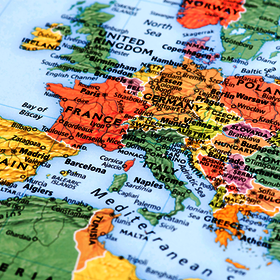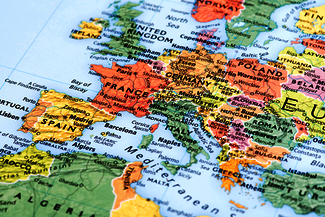Will Europe’s strong run continue?
Managers bullish about Europe’s value bias and ESG focus.

Managers bullish about Europe’s value bias and ESG focus.

European markets have hit record highs in recent weeks buoyed by strong corporate earnings and prospects for an economic rebound. Is this impressive run a short-term recovery bounce or could it be the start of a new era for European equities?
The Association of Investment Companies (AIC) has spoken to managers from the Europe and European Smaller Companies sectors about the impact of Brexit, Europe’s tech catch-up, COVID risks and the outlook for investing in Europe.
Will Europe’s strong run continue?
John Bennett, Fund Manager of Henderson European Focus Trust, said: “In short, yes. It’s our belief that the COVID-19 pandemic will come to be seen as having ushered in a different political zeitgeist and, with it, a resurgence among the so-called ‘value’ sectors in the stock market. If so, we stand a great chance of witnessing the unthinkable: Europe outperforming the USA. Since June 2020 we have been bullish on the prospects for European equities. The last decade has been driven by growth constructs – particularly in the US – which left Europe, with its bias towards value, in its wake. However, I believe the monetary, fiscal and geopolitical response to the COVID-19 pandemic will be a gamechanger for this investment regime. We have already begun to see the tide turn in markets, as value makes its way back to the fore. I believe we are in the foothills of this move.
“Additionally, whilst the last ten years have been all about tech, we must consider that a new race is underway: the ESG race. In my opinion, Europe is well placed to be a leader in ESG. The EU has put great emphasis on sustainability, with the Green Recovery Fund devoting nearly €550bn to green projects. This is a significant pledge and reflects the EU’s desire to maintain momentum and to propel its position in all matters ESG.”
Francesco Conte, Manager of JPMorgan European Smaller Companies, said: “Europe’s strength is its ability to manufacture highly engineered, premium products that are exported worldwide. It should not be a surprise that with global trade having been bruised as a result of the pandemic, Europe’s dominance in premium cars, aeroplanes and luxury goods will have had a negative impact on the region. Conversely, following unprecedented fiscal and monetary policy, we should not be surprised to see Europe benefit once again as the current anaemic economic recovery morphs into a synchronised global recovery. European small caps, specifically, have performed strongly over the long term, relative to other asset classes, due to their superior earnings growth, and we see no reason for this to change. The inefficiencies of the asset class and its less macroeconomic driven nature, as compared with larger companies, offer greater opportunity for active stock pickers with a track record of good stock selection.”
The attractions of Europe
George Cooke, Fund Manager of Montanaro European Smaller Companies, said: “Europe has around 4,000 listed businesses to choose from – most of which are smaller companies – so we are spoilt for choice when it comes to finding good companies to invest in. Moreover the region is full of inefficiencies: annual reports may not be in English, many companies have little or no sell-side research available on them and so on. This means that for those with a high level of in-house resources, there is greater opportunity to find hidden gems – high quality, growing companies that trade on reasonable valuations because few investors have ever heard of them.”
Ollie Beckett, Fund Manager of TR European Growth, said: “In our view, European smaller companies continue to be an attractive sector within world markets for a number of reasons, including exposure to high growth niches such as fintech, computer gaming, e-commerce and green energy, whilst Europe as a region is highly geared to global trade and would benefit from a pickup in global GDP.”
Europe’s tech catch-up
Chris Davies, Co-Portfolio Manager of Baillie Gifford European Growth, said: “Europe has long been something of an underdog in terms of tech. Europe has had no FAANGs or BATs. This is changing rapidly thanks to vibrant tech ecosystems that have sprung up around Europe, much greater availability of capital, and importantly many more investors who understand innovation and how to build disruptive companies. The implications of these changes for future investment opportunities – Europe’s ‘catch-up’ – are not yet well understood.”
George Cooke, Fund Manager of Montanaro European Smaller Companies, said: “When people think about technology it usually conjures up images of Silicon Valley, but contrary to popular perception there are thriving tech hubs on the continent too. We find many of these companies fit the criteria we are looking for: structural growth, high quality, profitable and cash generative business models with high levels of recurring revenue. But even beyond this, Europe is so special because it has global leaders in growing niches across sectors and countries – companies making helmet inserts that help protect against rotational motion, luxury cashmere clothing or automatic cell counters for healthcare applications to name but a few.”
Brexit – a limited impact
Chris Davies, Co-Portfolio Manager of Baillie Gifford European Growth, said: “Brexit has so far had limited impact on our portfolio companies, but that’s not to say they’ve been unaffected. Our long-term holding Ryanair and the more recently purchased holding in the airline Wizz Air have both had to reduce the voting rights of non-EU shareholders to comply with regulations on airline ownership, meaning that these shareholders have much less voting power than they otherwise would.”
Sam Morse, Portfolio Manager of Fidelity European Trust, said: “With the UK and EU avoiding a reversion to WTO trading terms at the end of 2020, companies in continental Europe have no doubt benefitted from the resolution of this longstanding threat. As we look ahead, the companies we speak to are confident they have sufficient resource in place to navigate any further developments in the UK and EU’s trading relationship. In truth, many are global in their operations and the focus is very much on the opportunities post-COVID rather than the challenges posed by Brexit.”
Ollie Beckett, Fund Manager of TR European Growth, said: “What has become difficult for some continental European companies post-Brexit is to sell into the UK. Logistics issues have made it hard to offer the UK consumer a good customer experience from the continent. Delivery promises have been very difficult to meet and again, companies are having to adapt. This is likely to mean that a continental retailer will need a fulfilment capability within the UK, to meet British customers’ needs.”
COVID risks
Chris Davies, Co-Portfolio Manager of Baillie Gifford European Growth, said: “COVID has accelerated disruption across swathes of the economy and exposed the shortcomings of businesses that have failed to invest for the future. Europe is home to many of these. The biggest risk therefore is investing in the companies of yesterday rather than the companies of tomorrow.”
Sam Morse, Portfolio Manager of Fidelity European Trust, said: “COVID-19 was the dominant risk to markets over 2020. However, the outlook for the European economy appears increasingly optimistic. The roll-out of vaccines is stepping up across the continent and now presents the prospect of a meaningful reopening of services this year. Investors certainly expect a strong recovery in 2021 and we have already seen a lot of strength in markets. This suggests that much of the recovery may already be factored into share prices and prompts a degree of caution. Valuations in general look high and we fear any disappointment in earnings or dividend growth could leave the market vulnerable to a correction. We have seen significant swathes of fiscal and monetary support from governments and central banks, both globally and within Europe, over the past year. Again any indication of a shift in policy or support could spark concern and this is the bigger risk in our view.”
Ollie Beckett, Fund Manager of TR European Growth, said: “One of the risks as we come out of COVID is that we start to see inflationary pressures in the system which we have not seen for a long time. It is too early to confirm whether these pressures are structural or merely cyclical but we will mitigate this risk by trying not to overpay for growth and focusing on things like valuation and cash flow generation.”
Opportunities in wellness, the environment and consumer goods
Francesco Conte, Manager of JPMorgan European Smaller Companies, said: “Analysing the trust today, the most common threads in our investments can be grouped under wellness, technology and the environment. COVID-19 has not changed these trends but, in fact, reinforced the importance of them.
“When it comes to wellness, there is a growing appreciation of the importance of keeping fit and we saw many stories during the pandemic of people wanting gyms to remain open. Fitness is a growing industry and Technogym is an Italian manufacturer of fitness equipment for both home use as well as commercial gyms.
“As for the environment, we believe that reducing pollution, plastic and our carbon footprint is key to better welfare. We like companies that are likely to help scale the solutions to global sustainability challenges, for example through green energy. An example of this is Scatec, the Norwegian renewable energy producer.”
John Bennett, Fund Manager of Henderson European Focus Trust, said: “It is our view that as lockdown restrictions ease and the vaccine rollout continues, economies will re-open and people will go back to spending, travelling, living their lives and consuming. Having enjoyed a V-shaped recovery in the industrial sphere we think we stand on the verge of the same phenomenon in the consumer sphere. Europe is home to some truly global companies in this space and since late 2020 and into the early part of this year, we’ve positioned the portfolio to benefit from this potential V-shape recovery with additions including Adidas, Airbus, Carlsberg, EssilorLuxottica, Inditex, MOWI and Ryanair.”
-ENDS-
Follow us on Twitter @AICPRESS
Notes to editors
- The Association of Investment Companies (AIC) was founded in 1932 to represent the interests of the investment trust industry – the oldest form of collective investment. Today, the AIC represents a broad range of closed-ended investment companies, incorporating investment trusts and other closed-ended investment companies and VCTs. The AIC’s members believe that the industry is best served if it is united and speaks with one voice. The AIC’s mission statement is to help members add value for shareholders over the longer term. The AIC has 360 members and the industry has total assets of approximately £239 billion.
- Disclaimer: The information contained in this press release does not constitute investment advice or personal recommendation and it is not an invitation or inducement to engage in investment activity. You should seek independent financial and, if appropriate, legal advice as to the suitability of any investment decision. Past performance is not a guide to future performance. The value of investment company shares, and the income from them, can fall as well as rise. You may not get back the full amount invested and, in some cases, nothing at all.
- To stop receiving AIC press releases, please contact the communications team.





